
The shallot is a cultivar group of the onion. Until 2010, the shallot was classified as a separate species, Allium ascalonicum. The taxon was synonymized with Allium cepa in 2010, as the difference was too small to justify a separate species.
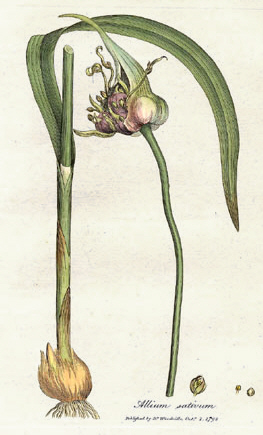
Garlic is a species of bulbous flowering plant in the genus Allium. Its close relatives include the onion, shallot, leek, chive, Welsh onion, and Chinese onion. It is native to South Asia, Central Asia and northeastern Iran and has long been used as a seasoning worldwide, with a history of several thousand years of human consumption and use. It was known to ancient Egyptians and has been used as both a food flavoring and a traditional medicine. China produced 73% of the world's supply of garlic in 2021.
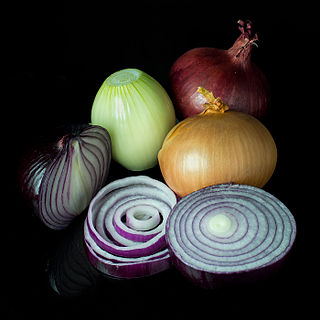
An onion, also known as the bulb onion or common onion, is a vegetable that is the most widely cultivated species of the genus Allium. The shallot is a botanical variety of the onion which was classified as a separate species until 2011. Its close relatives include garlic, scallion, leek, and chive.

Scallions are vegetables derived from various species in the genus Allium. Scallions generally have a milder taste than most onions and their close relatives include garlic, shallot, leek, chive, and Chinese onions.

Allium ursinum, known as wild garlic, ramsons, cowleekes, cows's leek, cowleek, buckrams, broad-leaved garlic, wood garlic, bear leek, Eurasian wild garlic or bear's garlic, is a bulbous perennial flowering plant in the amaryllis family Amaryllidaceae. It is native to Europe and Asia, where it grows in moist woodland. It is a wild relative of onion and garlic, all belonging to the same genus, Allium. There are two recognized subspecies: A. ursinum subsp. ursinum and A. ursinum subsp. ucrainicum.
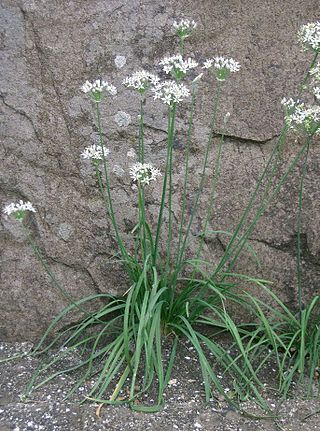
Allium tuberosum is a species of plant native to the Chinese province of Shanxi, and cultivated and naturalized elsewhere in Asia and around the world.

Allium tricoccum is a bulbous perennial flowering plant in the amaryllis family Amaryllidaceae. It is a North American species of wild onion or garlic widespread across eastern Canada and the eastern United States. Many of the common English names for this plant are also used for other Allium species, particularly the similar Allium ursinum, which is native to Europe and Asia. An edible plant, Allium tricoccum is used in a variety of North American and indigenous cuisines, and has also been used by Native Americans in traditional medicine. A French rendering (chicagou) of the Native American name for this plant is the namesake of the American city of Chicago.
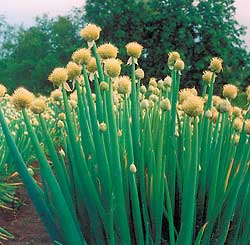
Allium fistulosum, the Welsh onion, also commonly called bunching onion, long green onion, Japanese bunching onion, and spring onion, is a species of perennial plant, often considered to be a kind of scallion.
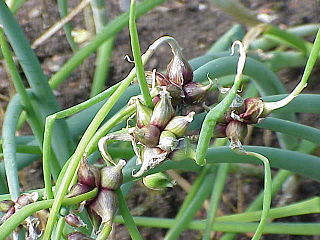
The tree onion is a perennial plant similar to the common onion (A. cepa), but with a cluster of bulblets where a normal onion would have flowers. Tree onions are also known as topsetting onions, walking onions, or Egyptian onions. Genomic evidence has conclusively shown that they are a diploid hybrid of the shallot and the Welsh onion (A. fistulosum). However, some sources may still treat the tree onion as A. cepa var. proliferum or A. cepa Proliferum Group.

Allium vineale is a perennial, bulb-forming species of wild onion, native to Europe, northwestern Africa and the Middle East. The species was introduced in Australia and North America, where it has become a noxious weed.

Allium canadense, the Canada onion, Canadian garlic, wild garlic, meadow garlic and wild onion is a perennial plant native to eastern North America from Texas to Florida to New Brunswick to Montana. The species is also cultivated in other regions as an ornamental and as a garden culinary herb. The plant is also reportedly naturalized in Cuba.

Allium nigrum, common name black garlic, broad-leaved leek, or broadleaf garlic, is a Middle Eastern species of wild onion. It lacks the onion or garlic scent shared by most of the other species in the group. The species is native to Turkey, Cyprus, Syria, Lebanon, and Israel but cultivated as an ornamental in many other places. It has become naturalized in some regions, including parts of the United States.
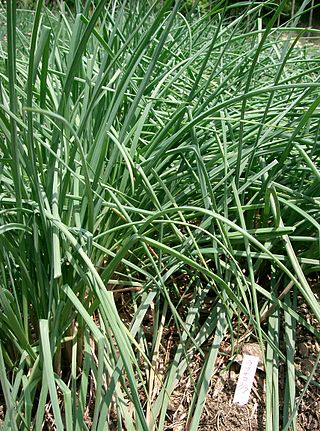
Allium chinense is an edible species of Allium, native to China, and cultivated in many other countries. Its close relatives include the onion, shallot, leek, chive, and garlic.

Allium cernuum, known as nodding onion or lady's leek, is a perennial plant in the genus Allium. It grows in open areas in North America.

Allium cristophii, the Persian onion or star of Persia, is a species of flowering plant in the family Amaryllidaceae, native to Iran, Turkey, and Turkmenistan, though grown as an ornamental bulbous plant in many parts of the world. It may be sold under the synonym of Allium albopilosum.
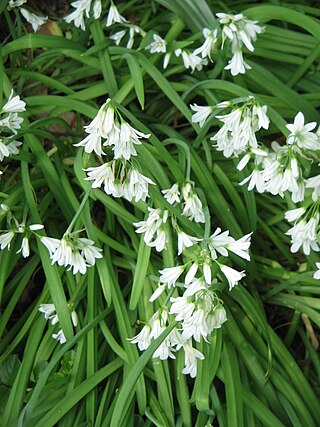
Allium triquetrum is a bulbous flowering plant in the genus Allium native to the Mediterranean basin. It is known in English as three-cornered leek, in Australia as angled onion and in New Zealand as onion weed. Both the English name and the specific epithet triquetrum refer to the three-cornered shape of the flower stalks.

Allium is a genus of monocotyledonous flowering plants with hundreds of species, including the cultivated onion, garlic, scallion, shallot, leek, and chives. The generic name Allium is the Latin word for garlic, and the type species for the genus is Allium sativum which means "cultivated garlic".

The leek is a vegetable, a cultivar of Allium ampeloprasum, the broadleaf wild leek. The edible part of the plant is a bundle of leaf sheaths that is sometimes erroneously called a stem or stalk. The genus Allium also contains the onion, garlic, shallot, scallion, chives, and Chinese onion. Three closely related vegetables, elephant garlic, kurrat and Persian leek or tareh, are also cultivars of A. ampeloprasum, although different in their uses as food.
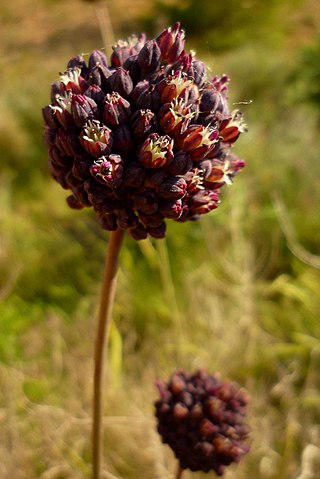
Allium melananthum, called ajo oscuro, ajo negro or ajo de flor negra, is a species of wild garlic native to southeast coastal areas of Spain. It is similar to three other species of Allium of the western Mediterranean; A. pruinatum, A. sphaerocephalon and A. ebusitanum, but can be distinguished from them by its dark purple to blackish-purple tepals, and its exerted stamens.



















